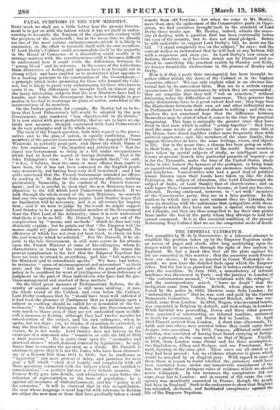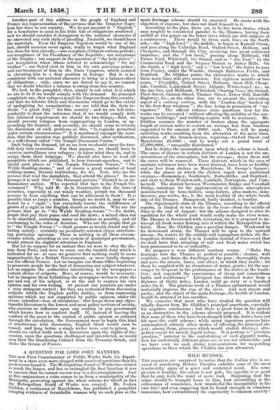THE IMPERIAL ULTIMATUM.
TILE pamphlet by M. de la Guerroniere is a laboured attempt to establish the position taken up by-the Emperor Napoleon under an access of anger and alarm, after long meditating upon the danger which he perceives through the right of free asylum in England. He has a fixed idea that all the plots against his life are concerted in this country ; that the assassins reach France from our shores. It was so asserted in Count Walewski's de- spatch ; we now have the detailed facts upon which the Emperor relies. But the list is so pieced out that it refutes ratherthan sup- ports the assertion. In June 1852, a manufactory of infernal machines was discovered in Paris ; and the journey to London of " the contumacious accused," " his relations with the refugees," and the correspondence seized, " leave no doubt "- that the instigation came from London. Kelsch, whose plans were de- feated by the police in 1853, likewise came from London ; for "information proves" that he was sent and paid by the Central Democratic Committee. Next, Sergeant Boichot, who was con- victed, came from London. In 1854, Mogen, who invented bombs, was convicted in Belgium by default, and took refuge in London. While his trial was proceeding, Heron and three other persons were convicted of constructing an infernal inaelline, sentenced to death for contumacy, and Heron fled to London. In April 1854 Pianori arrived from London. A short time afterwards, Ii- baldi and two others were arrested before they -could. carry their designs into execution. In 1855, Carpeza, affiliated with secret societies, was convicted of having been found carrying at Battig- nolles a grenade on the same model as that of Mogen. Finally, in 1858, from London came Orsini and his three accomplices; two Englishmen, Allsop and Hodges, and one Frenchman, Ber- nard, figuring in the same plot. These cases are all stated ea if they had been proved ; but no evidence whatever is given which would be accepted by an 'English jury. With regard to "some of them there is reason to doubt whether the prisoners could have been convicted here, under any conceivable iineridment of the law, but under:those stringent rules of evidence Whieh we should never relinquish,' In two instances the conspirators did not come from but to London;. and in several of the cities the con- spiracy was manifestly concocted in France, though the people had been in England. Such is the endeavour to show-that England
has tolerated, sheltered, and facilitated conspiracies -against the , life of the Emperor Napoleon.
Another part of this address to the people of England and France is a representation of the services that the Emperor Napo- leon has done to our country. We do not account it "English" for a benefactor to send in his little bill of obligations conferred ; and we should consider it derogatory to the national character if we answered any such style of pleading. No doubt, we should have the materials. Even the Emperor Napoleon would be one of the last, should occasion occur again, really to forget what England has done for him already,—our reception of him at various periods ; our acceptance of his Presidency of the Republic ; our acceptance of the Empire ; our support in the question of " the holy places " ; our recognition when others refused to acknowledge " Sir my brother" ; our Royal visit to him in his own parvenue palace ; and our treatment of him in the Paris Congress, which assisted in elevating. him to a first position in Europe. But it is in- consistent with our national character to bring in a balance-sheet of obligations ; only, since we are forced to say it, we remark that we doubt whether a balance is owing from this country.
We look to the pamphlet, then, simply to ask what it is which we are to do if we would comply with the demand. Its principal complaints are, that refugees assail the Emperor from this country, and that we tolerate libels and discussions which go to the extent of apologizing for assassination ; we are told that the facts in- dicate a great duty " for this country ; and we are left inde- pendently to draw the inference that if we would comply with this laboured requirement we should do two things,—first, we should prevent refugees from congregating in London, or ap- proaching the frontier ; and secondly, we should cease to tolerate the discussion of such problems as this, " Is regicide permitted under certain circumstances ?" It is mentioned amongst the scan- dals, that the question was publicly discussed, after notification, in a coffeehouse called "the Temple Discussion Forum."
Such being the demand, let us see how we should carry the two- fold duty into execution. For that purpose, we should have to exercise surveillance over refugees ; to know what they do, and to assign them their lodgings. We should ,also have to read all pamphlets which are published, to hear funeral-speeches, and to attend such places as " the Temple Discussion Forum," " the Wylde Reading-rooms," and of course a great number, of local reading-rooms, literary institutions, &c. &c. Now, who are the persons that read the pamphlets, that attend the places ? In one passage it is said that " ten thousand persons" listened to an in- flammatory, oration. Who reported that fact to the French Go- vernment ? . Who told M.- de la Guerroniere that the laws of acoustics, especially in our windy weather, permit ten thousand persons lo hear anything that can be addressed to them ? It is possible that so large a number, though we doubt it, may be col- lected by a " sight " ; but everybody knows the indifference of gazers at a sight. in the English streets or suburbs. Who are the persons that go to "the Wylde Reading-rooms " F—No doubt, people that pay their pence and read the news ; a mixed class not to be classified, containing many as harmless as possible, and all conforming to the rules of decorum. Who are the people that go to " the Temple Forum ? "—Such persons as would attend any de- bating society ; certainly no peculiarly-selected clique entertain- ing particular opinions. There is nothing in all these circum- stances which, according to our system of municipal government, would attract the slightest attention in England. But let us suppose for an instant -that we were to obey the dic- tate from Paris, and were to carry. out the twofold duty which is indicated for us : at once we perceive that nothing could be more impracticable for a British Government, or more fatally danger- ous for official France. Let us imagine our Home Office beginning to prosecute people for the fact of discussing any subject whatever. Let us 'suppose the authorities interdicting to the newspapers a certain choice of subjects.. More, of course, would be necessary. Let us imagine them forbidding the newspaper-writer to state the pro and con of his subject, or at the end to express his own opinion and his own feeling. At present our journals are under a very stringent control ; for they are restrained from discussing subjects which the English public dislike, or from expressing opinions which are not supported by public opinion, under the severe interdict—loss of circulation : that keeps down any objec- tionable literature to the lowest and most paltry sections of society, who exercise-no influence upon any country or any government which knows how to conduct itself. If, instead of leaving the conduct of the press to the control of public opinion as enforced through the circulation, the Government were to begin this kind of interference with discussion, English blood would soon be roused, and '4ong before a single writer were sent to prison, we should see called forth such a discussion upon the rights of dis- cussion-, upon the questions challenged and interdicted, as would soon blow the blundering Cabinet from the Treasury-bench, and shake the throne of France.



























 Previous page
Previous page